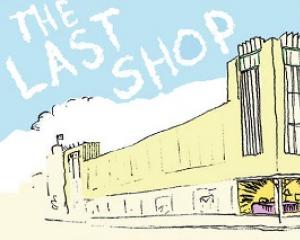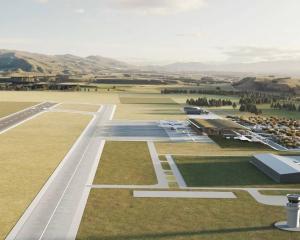Planning is key when you live on a 40,000ha station bordered on one side by a lake, surrounded by snowy peaks, and the only road in is at least an hour's drive. Sarah Harvey experienced isolation and working life at Mt Nicholas Station.
"That's the last jar of plum jam," Kate Cocks says as I spread the fruit-filled preserve thickly on my toast.
"Lucky it's almost plum season again."
Food has been on her mind a lot in the past 24 hours, it would seem.
This line of thought runs from the russet-coloured hens that scramble out of their house to scratch the lush grass, to the rows of sprouting vegetables and ready-to-burst berries in the large kitchen garden, and on to more pressing issues such as broken down freezers and the imminent arrival of 500kg of meat and the on-site cook requiring more supplies to feed hungry young shepherds.
Tucked behind the family homestead, where Kate's parents Lynda and Robert Butson still live, is a heavily stocked store where boxes are filled with cooking and baking essentials to restock pantry shelves.
When your "driveway" alone is more than an hour from the state highway these are things you need to think about.
Planning is a way of life at Mt Nicholas Station - a sprawling 40,000ha property on the shores of Lake Wakatipu, where 2300 Hereford cattle and 27,000 merino sheep are the responsibility of the 10 staff who run the station.
"We run a very simple system.
"We need to strike the right balance of staff otherwise we would all be living in each other's pockets," Mrs Cocks says.
She and husband Jack (both 33) live in a small redeveloped house with a million-dollar view on the lakefront.
Her parents' house is short walk up the hill.
Couple Bruce Collins and Adrian McNatty run a lodge in the old homestead, there are two full-time shepherds and a husband and wife who look after the cooking and the handyman jobs.
Mrs Cocks has been back at her family's farm for about a year, having lived the corporate life throughout the world for about 12 years.
Her brother Dave had managed the station while she was away but he had since gone to Australia to be a commercial helicopter pilot.
Her parents are still heavily involved with the running of the farm, although less so than when they first bought the property about 33 years ago.
Owning a high country station had been a dream of Mr Butson's for many years.
He had long held a fondness for Mt Nicholas Station, acquired during numerous tramping, hunting and fishing trips.
He approached the then owners, the Hunt family, and said, "If you are ever selling ask me first."
And that they did.
With new baby Kate, Robert and Lynda upped sticks from Garston, in Southland, and moved to the isolated station, where the only access was by boat or a dusty, gravel road.
The Butsons took a big risk in buying the station.
At that stage the farm was only running about 10,000 stock units - well below potential.
The first 15 years involved a lot of work clearing scrub, over-sowing fields and spreading fertiliser, as well as getting the stock numbers up.
"If you love living here, it is the sort of place you never want to leave.
"It has been a big part of our working life," Mr Butson said.
In the early years, a boat would dock at their wharf three days a week to drop them much-needed supplies and mail.
This service dried up years ago, but the family now have their own boat, in which they can cross Lake Wakatipu in 25 minutes, and in the summer peak the steamship TSSEarnslaw docks at neighbouring Walter Peak Station six times a day.
Most of their food is trucked in on a well-maintained public road.
But it is the little luxuries, like ultra-heat-treated cream to pour on the rhubarb crumble, that make life living in a harsh environment bearable.
"You have to be organised when you live somewhere like this.
"We are pretty self-sufficient most of the time with meat and with veges," Mrs Cocks says.
The internet has also changed things.
They have wireless broadband, which even for things such as paying bills has made a world of difference.
Where at one stage they would have had to make two trips to first collect the bill and then pay it, it can now be paid with the click of a button.
Water comes from a natural spring and power from a micro hydro station, installed in the 1940s, which is fed from dammed wetlands.
The wetlands are a lush and fertile feature in an otherwise harsh environment and attract a wide range of birdlife.
To protect this for future generations the Butsons have put a QEII trust covenant on the area.
The station also seems to be bustling with the busyness of teenagers.
Mrs Cocks said they often have young people come to the station over the summer.
Malcolm Gibson, a high school pupil from Gore, can hardly wait to get to the station.
He comes the same day as he finishes school and stays for the summer.
A nationally ranked kayaker, he spends the early evenings training on Lake Wakatipu.
And then there is Rosie Burkitt, a veterinary student from Auckland, who until a few weeks ago had never stepped foot on a farm but is managing to hold her own with the young shepherds when it comes to tailing and drenching wriggling lambs.
Mrs Cocks says the young visitors come to Mt Nicholas and learn about traditional farming -high country stations they way they used to be.
Some things have changed in the more than 120 years of the station, while some remain the same.
The station was settled in about the 1870s by the White family.
There had been many families since then, but many walked off the station because of the scourge of rabbits, Mrs Cocks said.
Small huts dotted throughout the station used to house shepherds, who would hunker down for the winter and spend two to three months with only sheep for company.
Now, the family use helicopters to check whether any stock has been missed and also to get musterers to mountainous areas.
Planes are used for spreading fertiliser.
But these extremes of modernisation are paired with very traditional ways.
"It is traditional farming with a modern mix," she said.
Mustering usually involves at the most a hardy vehicle and at the least a sturdy pair of legs to climb the imposing peaks.
They shear the merinos once a year.
Shearing usually starts in August and goes for about six weeks.
About 70% of their income comes from wool and 85% of that wool is sent to clothing firm Icebreaker.
The five-year contracts with the company are a luxury as they know exactly what they are getting, something which is priceless in terms of planning and means they are better placed to deal with the variables of farming.
Eyes are kept firmly on the future at Mt Nicholas Station.
The family has very long-term plans - up to 20 years in advance "We never tried to do everything in a hurry.
"We always looked at the fact that we would be here forever," Mr Butson said.
His daughter agreed: "We are really into long-term planning.
"We hope that our children will be able to get as much use of the land as we have.
"We have always been about thinking about the long term; we have never been into quick fixes or making a quick buck.
"We want to be sustainable; we are looking after the land for the next generation."
But it is a way of life and it is not for everyone.
An RT transmitter on one of their peaks means they can keep in contact constantly.
"Safety is a really big concern here."
The RT system is particularly reassuring for Kate, who is expecting her first baby.
Both of the Butson children were home schooled until high school age, something Mrs Cocks says she will have to learn to do with her own children.
She went to school in Christchurch and then Lincoln University, where she completed an agricultural science degree followed by a masters degree in agribusiness.
Her husband did a bachelor of commerce in agriculture at Lincoln and then a masters in agricultural economics at the University of Illinois.
The Butsons never pushed their children into taking over the farm. "It is quite a thrill to think I have got two kids who are both interested in taking over the family farm," Mr Butson said.
"It is still a difficult place to live.
"You have got to love being here to be here.
"The high country is a fragile environment.
"You have got to work within that.
"You are looking after the land so it looks after you and your family forever.
"They are a privilege to own, these places.
"They are a special way of life."











